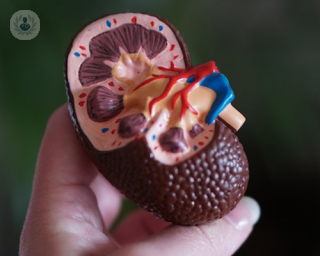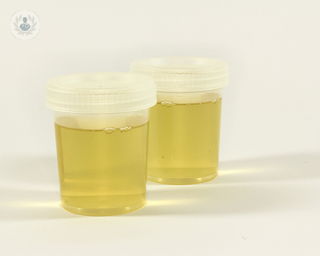What is glomerulonephritis?
Glomerulonephritis is a disease in which the minute renal units responsible for filtering, the glomeruli, are damaged, and become irritated and swollen (inflammation). As a result, kidney function is impaired.
Glomerulonephritis is described as acute when it develops suddenly, and chronic when it develops over many years.

Symptoms of glomerulonephritis
- Red or dark brown urine.
- Lower urine production.
- Greater effort required for breathing.
- Fatigue and hypertension.
- Oedema.
What are the causes of glomerulonephritis?
Sometimes, the exact cause of glomerulonephritis is not known. However, in many cases, it is due to a problem with the immune system. In the majority of cases, it is an autoimmune disease in which the body makes antibodies directed against a specific element of the renal tissue, harming the kidneys and leading to inflammation.
Can it be prevented?
In many cases, glomerulonephritis can be diagnosed via laboratory tests before symptoms and other signs appear. Although it cannot be detected with standard urinalysis, it can be detected early, when it is more amenable to treatment.
In general terms, renal diseases can be prevented by optimal hydration of the kidneys and urinary tracts, e.g. by ingesting sufficient liquids and not using tobacco.
What is the treatment?
The treatment varies according to the type of glomerulonephritis. Fortunately, in many cases, the disease resolves spontaneously. If not, doctors can do many things to help:
Acute glomerulonephritis:
- Treatment of oedema with diuretic drugs
- Treatment of high blood pressure
- If the cause is a bacterial infection, antibiotics are used.
Chronic glomerulonephritis:
- Treatment of high blood pressure.
- Control of body fluids.
- Low-protein diet.
Glomerulonephritis
What is glomerulonephritis?
Glomerulonephritis is a disease in which the minute renal units responsible for filtering, the glomeruli, are damaged, and become irritated and swollen (inflammation). As a result, kidney function is impaired.
Glomerulonephritis is described as acute when it develops suddenly, and chronic when it develops over many years.

Symptoms of glomerulonephritis
- Red or dark brown urine.
- Lower urine production.
- Greater effort required for breathing.
- Fatigue and hypertension.
- Oedema.
What are the causes of glomerulonephritis?
Sometimes, the exact cause of glomerulonephritis is not known. However, in many cases, it is due to a problem with the immune system. In the majority of cases, it is an autoimmune disease in which the body makes antibodies directed against a specific element of the renal tissue, harming the kidneys and leading to inflammation.
Can it be prevented?
In many cases, glomerulonephritis can be diagnosed via laboratory tests before symptoms and other signs appear. Although it cannot be detected with standard urinalysis, it can be detected early, when it is more amenable to treatment.
In general terms, renal diseases can be prevented by optimal hydration of the kidneys and urinary tracts, e.g. by ingesting sufficient liquids and not using tobacco.
What is the treatment?
The treatment varies according to the type of glomerulonephritis. Fortunately, in many cases, the disease resolves spontaneously. If not, doctors can do many things to help:
Acute glomerulonephritis:
- Treatment of oedema with diuretic drugs
- Treatment of high blood pressure
- If the cause is a bacterial infection, antibiotics are used.
Chronic glomerulonephritis:
- Treatment of high blood pressure.
- Control of body fluids.
- Low-protein diet.


My eGFR is below normal: Do I have a kidney disease?
By Dr James Pattison
2024-12-27
We learn more about eGFR testing and how results are interpreted in this detailed guide from highly esteemed consultant nephrologist Dr James Pattison. See more


Protein in your urine: could it be glomerulonephritis?
By Dr Christopher Lawrence
2024-12-26
Glomerulonephritis is an umbrella term for a group of kidney diseases that affect the blood vessels in your kidney. Glomerulonephritis can cause significant damage to your kidneys if left untreated. The problem is that the symptoms can be nebulous – and diagnosis is difficult. We spoke to leading consultant nephrologist Dr Christopher Lawrence about what symptoms patients should watch out for, and what the doctor will do if they suspect glomerulonephritis. See more


IgA nephropathy: Your expert guide
By Dr James Pattison
2024-12-26
Highly respected consultant nephrologist Dr James Pattison discusses the key causes and symptoms IgA nephropathy, a type of kidney disorder, in this detailed guide. See more


Glomerulonephritis – A quick guide
By Professor Jeremy Levy
2024-12-24
Glomerulonephritis can refer to a wide variety of kidney diseases, which sometimes can affect the whole body. Highly distinguished consultant nephrologist, Professor Jeremy Levy, guides us through the symptoms of glomerulonephritis and how to treat it. See more
Experts in Glomerulonephritis
-
Professor Liz Lightstone
NephrologyExpert in:
- Pregnancy and kidney disease
- Glomerulonephritis
- Proteinuria (protein in the urine)
- Lupus
- Nephropathy (Kidney disease)
- Diabetic nephropathy
-
Professor Jeremy Levy
NephrologyExpert in:
- Chronic kidney disease
- Diabetic nephropathy
- Glomerulonephritis
- Polycystic kidney disease (PKD)
- Proteinuria (protein in the urine)
- Urinary tract infection
-
Dr Mark Thomas
NephrologyExpert in:
- Chronic kidney disease
- Hypertension (high blood pressure)
- Glomerulonephritis
- Diabetic nephropathy
- Acute kidney injury (AKI)
- Urinary tract infection
-
Dr Richard Hull
NephrologyExpert in:
- Chronic kidney disease
- Diabetic nephropathy
- Glomerulonephritis
- Proteinuria (protein in the urine)
- Hypertension (high blood pressure)
- Polycystic kidney disease (PKD)
- See all

OneWelbeck Digestive Health
OneWelbeck Digestive Health
1 Welbeck St, London, W1G 0AR
No existe teléfono en el centro.
By using the telephone number provided by TOP DOCTORS, you automatically agree to let us use your phone number for statistical and commercial purposes. For further information, read our Privacy Policy
Top Doctors

New Victoria Hospital
New Victoria Hospital
184 Coombe Lane West, Kingston upon Thames, KT2 7EG
No existe teléfono en el centro.
By using the telephone number provided by TOP DOCTORS, you automatically agree to let us use your phone number for statistical and commercial purposes. For further information, read our Privacy Policy
Top Doctors
-
OneWelbeck Digestive Health
1 Welbeck St, London, W1G 0AR, W1G Marylebone LondonExpert in:
- Digestive
- Colorectal surgery
- Colorectal
- Gastroenterology
- Acid reflux
- Irritable bowel syndrome
-
New Victoria Hospital
184 Coombe Lane West, Kingston upon Thames, KT2 7EG, South LondonExpert in:
- Cardiology
- General Surgery
- Orthopaedic surgery
- Breast augmentation
- Pain management
- Spine
- See all
- Most viewed diseases, medical tests, and treatments
- Narcolepsy
- Snoring
- Polysomnography (sleep study)
- Alzheimer's disease
- Chronic headache
- Autoimmune diseases
- Joint pain
- Nutrition
- Abdominal pain
- Vaginal cytology





